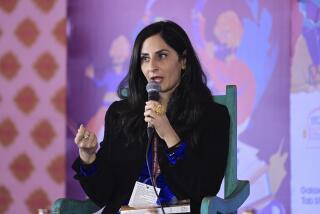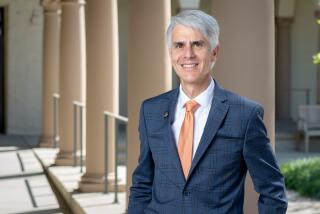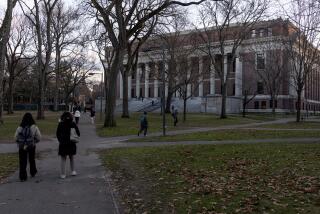Mills Chooses Woman From Princeton
- Share via
OAKLAND — Mills College, the women’s school whose students last spring became embroiled in a bitter dispute over admitting men, Monday named a popular Princeton University administrator as its president.
Janet McKay, 42, vice provost of Princeton University in New Jersey, became the college’s 12th president and the third consecutive woman to hold that title. She will take over July 15 from interim President Virgina Smith.
“This is the beginning of a very long love affair with Mills College,” McKay told a jubilant audience composed mostly of undergraduates. When she heard of the school’s struggle to remain a single-sex institution last year, she said: “I wanted to become a Mills woman. Now I am one.”
Mills stands with Scripps College in Claremont and Mount St. Mary’s in Los Angeles as the only remaining women’s colleges in the state and one of 94 left in the country; 30 years ago, there were nearly 300. Founded in 1852 as a high school, it enrolls 774 undergraduates.
McKay’s appointment follows a tumultuous year for the campus that began when administrators, supported by then-President Mary Metz, resolved in May to bolster dwindling enrollment by admitting men to its undergraduate programs. Mills College has allowed men to enroll in graduate courses since before World War II.
The decision drew angry protests from students, who promptly blockaded school buildings and boycotted classes. Later that month, leaders overturned the decision to enroll male undergraduates, saying they would give Mills from three to five more years to succeed financially as an all-women’s school. Metz resigned five weeks later.
“I have been asked to be president of a women’s college, and that is my intention,” McKay said, affirming her commitment to single-sex education.
McKay, a native of Chicago, was considered one of the rising leaders at Princeton, according to students who dealt with her. She earned master’s and Ph.D. degrees in linguistics from that university and taught classes in English composition and literature at the University of Maryland at College Park and the University of the District of Columbia before returning to Princeton.
In 1988, she was appointed a senior academic administrator in charge of managing part of the school’s budget. To many students of both sexes, she became a champion of women’s issues, gaining a reputation as a levelheaded, accessible leader.
Her brief introductory speech inside the Mills concert hall drew rave reviews from many of the undergraduates and alumnae who had waited for months to learn who the next president would be.
Kristin Bell, a senior studying psychology, said: “I’ve got a good feeling about her. She’s great. It seems like she’s the type to walk softly and carry a big stick.”
“She’s wonderful,” said Dodie Rosekrans, a member of the board of trustees. “I like her credentials. They’re extraordinary.”
McKay left a different impression on some Princeton students.
“She’s always gone along with the big boys,” said Jennifer Weiner, a senior at Princeton. “I heard about her going to Mills, but she doesn’t strike me as a feminist--at least not that kind of feminist.”
Ingrid Eagly, a senior who worked with McKay on a committee to improve women’s status at Princeton, attributed criticism of McKay to the harsher standards used to judge women leaders than are used for male counterparts.
“Women are subject to more criticism when it comes to women’s issues,” she said. “I think she did a good job.”
More to Read
Sign up for Essential California
The most important California stories and recommendations in your inbox every morning.
You may occasionally receive promotional content from the Los Angeles Times.













